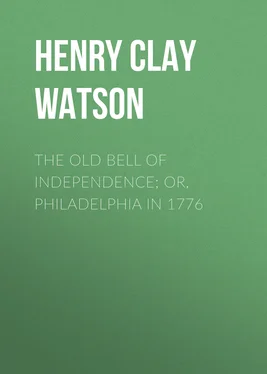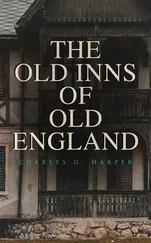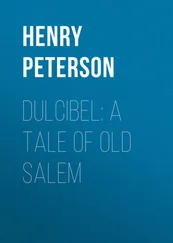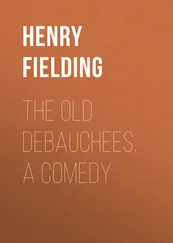Henry Clay Watson - The Old Bell of Independence; Or, Philadelphia in 1776
Здесь есть возможность читать онлайн «Henry Clay Watson - The Old Bell of Independence; Or, Philadelphia in 1776» — ознакомительный отрывок электронной книги совершенно бесплатно, а после прочтения отрывка купить полную версию. В некоторых случаях можно слушать аудио, скачать через торрент в формате fb2 и присутствует краткое содержание. Жанр: foreign_prose, История, foreign_edu, foreign_antique, на английском языке. Описание произведения, (предисловие) а так же отзывы посетителей доступны на портале библиотеки ЛибКат.
- Название:The Old Bell of Independence; Or, Philadelphia in 1776
- Автор:
- Жанр:
- Год:неизвестен
- ISBN:нет данных
- Рейтинг книги:3 / 5. Голосов: 1
-
Избранное:Добавить в избранное
- Отзывы:
-
Ваша оценка:
- 60
- 1
- 2
- 3
- 4
- 5
The Old Bell of Independence; Or, Philadelphia in 1776: краткое содержание, описание и аннотация
Предлагаем к чтению аннотацию, описание, краткое содержание или предисловие (зависит от того, что написал сам автор книги «The Old Bell of Independence; Or, Philadelphia in 1776»). Если вы не нашли необходимую информацию о книге — напишите в комментариях, мы постараемся отыскать её.
The Old Bell of Independence; Or, Philadelphia in 1776 — читать онлайн ознакомительный отрывок
Ниже представлен текст книги, разбитый по страницам. Система сохранения места последней прочитанной страницы, позволяет с удобством читать онлайн бесплатно книгу «The Old Bell of Independence; Or, Philadelphia in 1776», без необходимости каждый раз заново искать на чём Вы остановились. Поставьте закладку, и сможете в любой момент перейти на страницу, на которой закончили чтение.
Интервал:
Закладка:
"Roused by this manly and pathetic appeal, a low murmur ran from man to man, as a heartfelt response; and the chieftains who were near the speaker, felt proud and happy in the command of such true hearts and tried blades. But darkness was enveloping all, and he hastened to conclude.
"'They that take the sword shall perish by the sword.'
'You have taken the sword, but not in the spirit of wrong and ravage. You have taken the sword for your homes, for your wives, for your little ones. You have taken the sword for truth, for justice and right, and to you the promise is, Be of good cheer, for your foes have taken the sword in defiance of all that man holds dear, in blasphemy of God—they shall perish by the sword .
'And now, brethren and soldiers, I bid you all farewell. Many of us may fall in the fight of to-morrow—God rest the souls of the fallen; many of us may live to tell the story of the fight of to-morrow; and, in the memory of all, will ever rest and linger the quiet scene of this autumnal night.
'Solemn twilight advances over the valley; the woods on the opposite heights fling their long shadows over the green of the meadow; around us are the tents of the continental host, the suppressed bustle of the camp, the hurried tramp of the soldiers to and fro among the tents, the stillness and silence that marks the eve of battle.
'When we meet again, may the long shadows of twilight be flung over a peaceful land.
'God in heaven grant it.'
"And now the last ray of lingering light had departed, and they were left in darkness. Presuming it proper to dismiss his auditors, he proposed a parting prayer, and immediately every head was uncovered and bowed in reverence, while, with outstretched hands, that sincere old man in the homespun garb thus addressed the throne of grace.
"'Great Father, we bow before thee. We invoke thy blessing, we deprecate thy wrath, we return thee thanks for the past, we ask thy aid for the future. For we are in times of trouble, oh, Lord! and sore beset by foes, merciless and unpitying; the sword gleams over our land, and the dust of the soil is dampened with the blood of our neighbors and friends.
'Oh! God of mercy, we pray thy blessing on the American arms. Make the man of our hearts strong in thy wisdom; bless, we beseech, with renewed life and strength, our hope and thy instrument, even GEORGE WASHINGTON. Shower thy counsels on the honorable, the Continental Congress. Visit the tents of our host; comfort the soldier in his wounds and afflictions; nerve him for the hour of fight; prepare him for the hour of death.
'And in the hour of defeat, oh, God of Hosts, do thou be our stay; and in the hour of triumph be thou our guide.
'Teach us to be merciful. Though the memory of galling wrongs be at our hearts, knocking for admittance, that they may fill us with desires for revenge, yet let us, oh, Lord, spare the vanquished, though they never spared us in their hour of butchery and bloodshed. And, in the hour of death, do thou guide us into the abode prepared for the blest; so shall we return thanks unto thee, through Christ, our Redeemer.—GOD PROSPER THE CAUSE.— Amen "
During the recital of this interesting and thrilling incident of the Revolution, the veterans—even Higgins, too—laid down their knives and forks, and listened as if carried back to the memorable eve of the battle of Brandywine, and filled with the hopes and fears of the period. At its conclusion, they expressed their approbation of the manner of the recital, and the beauty of the sermon.
"That minister was one of the kind that I like," said Wilson. "He could preach peace as long as peace was wise, and buckle on his armor and fight when it became his duty."
"Mr. Harmer handles his pen well," remarked Morton, "but such an incident would make any pen write well of itself. There's fire in it."
"Yes, a whole heap of fire," put in Mrs. Harmar, who thought she must make a remark, as she had been quieting the children while the latter part of the sermon and the remarks upon it were listened to by the others.
"But the Lord didn't assist us much in that next day's battle," said old Harmar. "We had hard fighting, and then were compelled to retreat."
"It was all for the best," said Wilson. "We shouldn't have known our enemies nor ourselves without losing that battle. The harder the struggle for liberty, the more we enjoy it when won."
"That's true," said young Harmar, "The freedom dearest bought is highest prized, and Americans have learned the value of that inestimable gem."
The dinner was, by this time, pretty well disposed of, and the party adjourned to the large parlor, where they were soon comfortable seated. Mrs. Harmar would make one of the company, and the children would force their way in to see and hear the "sogers." The windows were up, and the gentle breeze of summer blew softly through the parlor, thus relieving the otherwise oppressive atmosphere.
But we must introduce the company to the reader. Old Hannar was seated on one end of the sofa, with one of the small children on his knee. He was a stout, hearty-looking man of about seventy, with silvery hair, and a face much embrowned by exposure and furrowed by time. The general expression of his features was a hearty good humor, as if perfectly satisfied with things around. On the other end of the sofa sat Mr. Higgins, a thin, small-featured, bald-headed man, looking much older than old Mr. Harmar. On the opposite sofa sat Mr. Morton and Mr. Wilson. The first was a large-bodied, full-faced man, slightly bald, with a scar across his forehead, from the right eye to the left side of his head. His appearance bespoke an active life, and a strong constitution; and his eye yet beamed with intelligence. Mr. Wilson was evidently about seventy-five, with a long, lank face, tall figure, and head scantily covered with grey hair. Mr. Smith sat in an easy arm-chair. His appearance was much the same as that of Mr. Higgins, though his face expressed more intelligence. He had a troublesome cough, and was evidently very weak. Mr. Jackson Harmar sat on a chair next to his father. He was about thirty-five, rather short and thin, with long brown hair, wild, blue eyes, in a "fine frenzy rolling," and a very literary appearance generally. Mrs. Harraar sat near her husband, with two very mischievous little boys, apparently about six and eight years of age, by her side. She had a childish face, but might have been thought pretty by a loving and indulgent husband.
STORY OF THE PRAYER
"There is only one other scene during the struggle for our country's right," said young Harmar, "which I would compare with the one I have just narrated; and that is the scene in Congress—the old Continental Congress—during the first prayer by the Rev. Mr. Duche."
"I've heard something of that prayer," said Morton, "since the Revolution, but nothing that I could depend on."
"An account of the scene is given by John Adams, who was a chief actor in it," said young Harmar.
"Old John Adams?" enquired Higgins. "He was the man! He was the Washington of our politics during the war. He was the man!" and Higgins rubbed his hands together.
"Thomas Jefferson, take your foot off your brother's, and quit pinching him," interrupted Mrs. Harmar.
"I have Mr. Adams' account of that first prayer and its effects," said young Harmar, "and here it is." So saying, he pulled from his pocket a paper into which the account had been copied, and read:—
"'When the Congress met, Mr. Gushing made a motion that it should be opened with prayer. It was opposed by Mr. Jay, of New York, and Mr. Rutledge, of South Carolina, because we were so divided in our religious sentiments, some Episcopalians, some Quakers, some Anabaptists, some Presbyterians, and some Congregationalists, that we could not join in the same act of worship. Mr. Samuel Adams arose and said, 'that he was no bigot, and could hear a prayer from any gentleman of piety, and who was, at the same time, a friend of his country. He was a stranger in Philadelphia, but had heard that Mr. Duche (Dushay they pronounced it) deserved that character, and therefore he moved that Mr. Duche, an Episcopal clergyman, might be desired to read prayers to the Congress to-morrow morning.' The motion was seconded, and passed in the affirmative.—Mr. Randolph, our President, waited on Mr. Duche, and received for answer, that if his health would permit he certainly would. Accordingly, next morning he appeared with his clerk, and, in his pontificals, read several prayers in the established form, and then read the collect for the seventh day of September, which was the thirty-fifth psalm. You must remember, this was the next morning after we had heard the rumor of the horrible cannonade of Boston. It seemed as if Heaven had ordained that psalm to be read on that morning .
Читать дальшеИнтервал:
Закладка:
Похожие книги на «The Old Bell of Independence; Or, Philadelphia in 1776»
Представляем Вашему вниманию похожие книги на «The Old Bell of Independence; Or, Philadelphia in 1776» списком для выбора. Мы отобрали схожую по названию и смыслу литературу в надежде предоставить читателям больше вариантов отыскать новые, интересные, ещё непрочитанные произведения.
Обсуждение, отзывы о книге «The Old Bell of Independence; Or, Philadelphia in 1776» и просто собственные мнения читателей. Оставьте ваши комментарии, напишите, что Вы думаете о произведении, его смысле или главных героях. Укажите что конкретно понравилось, а что нет, и почему Вы так считаете.












